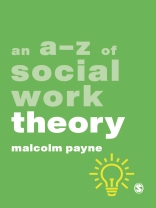Puzzled by terminology, skills, law, or theory? Revising for your placement or exam? Then look no further! This series of concise and easy-to-use A-Zs will be your guide.
Designed for both students and newly-qualified social workers, this book will introduce you to over 350 key theories, theorists and concepts in a concise and no-nonsense way. Careful cross-referencing will help you make important connections, while selected further reading will provide you with a springboard to further learning.
قائمة المحتويات
A
Acceptance
Accountability
Action/activity
Activism
Adaptation
Advocacy
Affect/affect regulation
Affiliation
African-centred practice
Ageing
Ageism
Agency
Aggression
Aggression management
Alienation
Alliance
Altruism
Ambiguity
Ambivalence
Anti-discriminatory practice
Anti-oppressive practice
Anti-psychiatry
Anti-racist practice
Art
Assessment
Attachment theory
Authenticity
Athentization
Authority
Autonomy
B
Balance
Bauman, Zygmunt
Beck, Ulrich
Being
Bereavement
Biestek, Felix
Biopsychosocial model
Black perspectives
Body
Body/mind/spirit work
Boundary
Bourdieu, Pierre
Broker
Buddhism
Bureaucracy
Business
C
Capacity-building
Capital
Care/caring
Care management
Case
Case management
Case record
Casework
Change
Chaos theory
Children
Christianity
Citizen advocacy
Citizenship
Codes of ethics
Cognitive behavioural therapy
Colonialism
Commodification
Commonalities
Community
Community development
Community social work
Community work
Complex adaptive systems
Consciousness-raising
Contracts
Constructionism/constructivism
Context
Coping
Co-production
Core conditions
Counselling
Crisis
Crisis intervention
Critical incident analysis
Critical practice theory
Critical race theory
Critical realism
Critical reflection
Critical thinking
Cultural competence
Cultural imperialism
Culture
D
Decolonization
Deconstruction
Dependence/dependency
Determinism/determinants
Development
Dewey, John
Diagnosis
Diagnostic practice theory
Dialectic
Dialogue/dialogical practice
Difference
Dignity
Disability
Disabled living movement
Disadvantage
Disasters
Discourse
Discretion
Discrimination
Disruption
Diversity
Dread
Diagnostic and Statistical Manual of Mental Disorders
Dual process theory
E
Eclecticism
Eco/ecocentric/ecological/ecosocial/green social work
Ecological systems/eco systems theory
Ego
Ego psychology
Emancipation
Embodiment
Emergence
Emotion
Emotional intelligence
Emotional labour
Empathy
Empiricism
Empowerment
The Enlightenment
Entrepreneurship
Epistemology
Equality
Equilibrium
Ethics
Ethics of care
Ethnic group/ethnicity
Evidence-based practice
exchange
exclusion
existentialism
F
Fairness
Family
Family group conferencing
Family social work
Family support implements
Family therapy
Feminist practice theory field
Fordism
Foucault, Michel
Foundationalism
Frame analysis/framing
Fraser, Nancy
Freedom
Freire, Paulo
Freud, Sigmund
Functional practice
Functionalism
Functional analysis
G
Gandhi, Mohandas Karamchand
Gender
General systems theory
Generalist/generic practice
Germain, Carel Bailey
Giddens, Anthony
Gilligan, Carol
Globalization
Goffman, Erving
Goldstein, Howard
Gramsci, Antonio
groups/small groups
group care
groupwork
H
Habermas, Jürgen
Habitus
Halmos, Paul
Hegemony
Helping
Holism
Hope
Human rights
Humanistic practice
Humanitarianism
I
Identity
Identity politics
Ideology
Impartiality
Inclusion
Indigenist theory
Individualization
Inequality
Insight
Institutionalization
Interdependence
Interpretivist theories
Intersectionality
Intersubjectivity
Intervention
‘in vivo’
Islam
J
Judgement
Justice
K, L
Labelling
Language issues/linguistic turn
Liberal ideas
Liberation
Liberation theology
Life course theories
Life model
M
Mc Donaldization
Macro practice
Maintenance
Managerialism
Manualization
Market
Marketization
Marx, Karl
Marxist social work
Materialism
Meaning
Medicalization
Medical model
Mental health
Milieu therapy
Millennium Development Goals
Mindfulness
Modality
Modernity
Moral panics
Motivational interviewing
Multicultural practice
Multidisciplinary/multiprofessional practice/teamwork
N
Narrative practice theory
Need
Neoliberalism
Networks
Neuroscience
New public management
Non-directiveness
Normalization/social role valorization
O
Object
Object relations
Oppression
Ordinary housing/ordinary living movements
Other/othering/otherness
P
Parker Follett, Mary
Participation/client participation
Pathologization
Patriarchy
Peer advocacy
Peer support
Performance
Personalization
Person-centred practice
Person-in-situation/person-in-environment
Pessimism
Place
Pluralism
‘Post’ ideas
Post-colonialism
Postmodernism
Poverty
Power
Pragmatism
Praxis
Principle-based ethics
Privatization
Privilege
Problem
Problematization
Problem/troubled families
Problem-solving theory
Proceduralization
Process
Professionalization
Progressivism
Psychoanalysis
Psychodynamic theory
Psychologization
Psychosocial theory
Q
Quality
Quasi-market
R
Race
Racism/institutional racism
Radical practice theory
Rawls, John
Reconceptualization movement
Reciprocity
Recognition
Recovery
Reflection
Reflexivity
Reframing
Reid, William J.
Relational practice
Relationship
Religion
Representation
Residential care/residential work
Resilience/resiliency
Resistance
Respect/respect for persons
Richmond, Mary (Ellen)
Rights
Risk
Role
Role ambiguity
Role complementarity
Role conflict
Role distance
Role set
S
Safeguarding
Salomon, Alice
Schön, Donald S.
Security
The self
Self-actualization
Self-advocacy
Self-determination
Self-direction
Self-efficacy
Self-respect
Semiotics
Sen, Amartya Kumar
Sheffield, Ada Eliot
Signs of safety
Slavery
Social
Social action
Social capital
Social care
Social change
Social construction
Social development
Social exclusion
Social justice
Social learning theory
Social movements theory
Social pedagogy
Social reproduction theory
Social problems
Social role valorisation
Social work
Social work theory
Solution practice theory
Space
Spirituality
Stage
Steady state
Stigma
Strengths practice
Structural practice
Structural psychodynamic theory
Structural-functionalism
Structuralism
Study
Subject
Support
Surveillance
Symbolic interactionism
Systems theory
T
Task
Task-centred practice
Technical assistance programmes
Technical rational/technicist practice
Theory
Therapeutic alliance
Therapeutic community theory
Time
Timms, Noel
Tokenism
Tongan social work
Total institutions
Traditional social work
Transformation
Transtheoretical model of change
Trauma
Troubled families
U
Underclass
V
Values
Virtue ethics
Voice
W
Weber, Max
Welfare
Welfare rights
Welfare state
Wisdom
Wolfensberger, W.
Working through
Wooton, Barbara
X, Y, Z
عن المؤلف
Malcolm Payne holds honorary professorial posts with Manchester Metropolitan University, where he was for many years professor and head of Applied Community Studies, and Kingston University London. He worked as a social worker and manager in probation, child and adult social care and in community, mental health and residential care development work in local and national voluntary organisations, and in social work education in the UK, Finland, Poland and Slovakia. Among his many books are Modern social work theory (5th edition, 2021), Humanistic social work, What is professional social work?, Citizenship social work with older people, and (edited with Emma Reith-Hall) The Routledge handbook of social work theory (2019).












